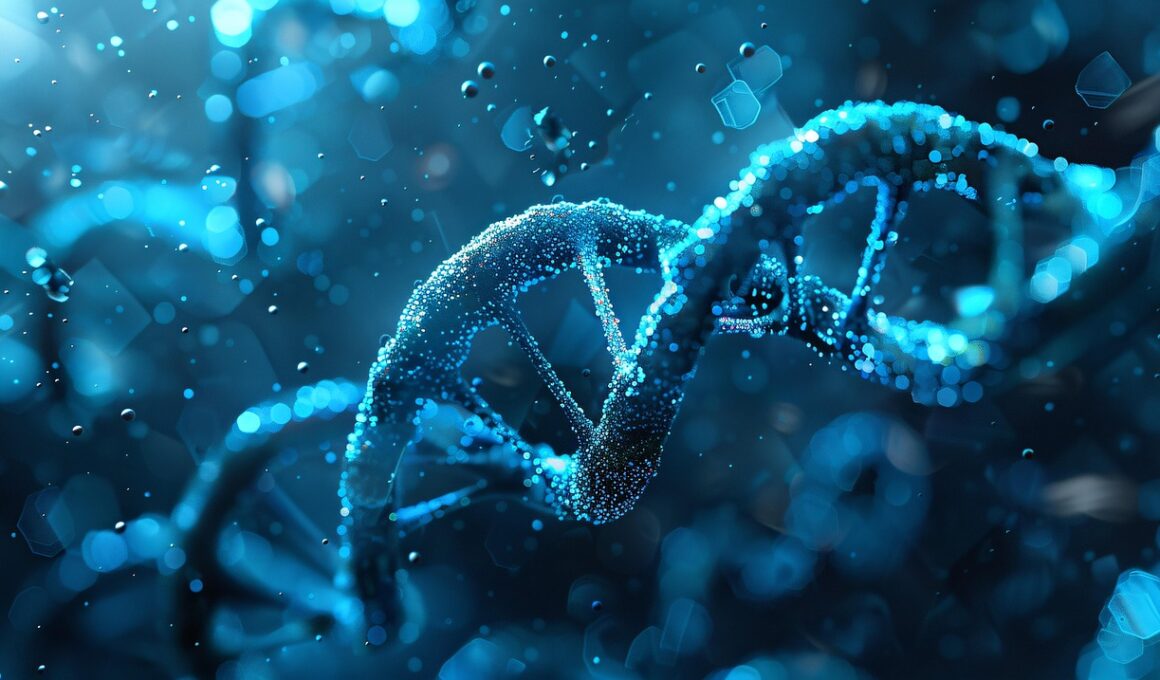The Interface Between Genetics and Nutrition in Exercise Physiology
The relationship between genetics and nutrition in exercise physiology is a fascinating area of study. Genetic attributes significantly influence how individuals respond to various nutritional interventions aimed at enhancing athletic performance. These genetic differences can dictate metabolism, muscle fiber composition, and recovery rates, which all play crucial roles in one’s physical fitness journey. Understanding these genetic variances is essential for tailoring nutrition plans to optimize training outcomes. When athletes incorporate their unique genetic profiles into nutritional strategies, they may experience improved energy levels, muscle growth, and overall performance. Research suggests that specific genetic markers can reveal predispositions for certain nutrient requirements and responses to macronutrients. Consequently, personalized nutrition plans based on genetic insights can help athletes achieve better results. Additionally, genetics impacts the way dietary components interact with an individual’s physiology, leading to different outcomes in strength, endurance, and recovery. Therefore, fitness professionals should consider genetic testing when developing nutrition programs that align with an athlete’s specific needs and goals. By embracing a genetic perspective in nutrition, athletes can maximize their training potential and reach their performance objectives more effectively.
Genetic Variability and Nutritional Responses
Genetic variability plays a critical role in how different individuals respond to specific nutritional strategies within exercise physiology. For instance, variations in genes related to metabolism can influence how efficiently one utilizes carbohydrates, fats, and proteins during physical activity. This variability subsequently affects an athlete’s choice of diet for optimal performance and recovery. When examining nutritional responses in athletes, it’s essential to consider genetic polymorphisms that affect nutrient absorption and utilization. Such variations might dictate not only meal preferences but also the timing of nutrient intake surrounding workouts. Furthermore, some individuals may harbor genetic predispositions that enhance sensitivity to certain diets, where others might struggle to adopt these same nutritional approaches. The effectiveness of high-protein or carbohydrate-rich diets may differ widely among athletes due to these genetic nuances. Research continues to reveal how specific genes interact with dietary components, ultimately shaping performance outcomes. Tailoring nutrition according to genetic makeup can assist trainers in creating more effective regimens, ensuring athletes receive the right nutrients at the right time for their unique needs.
Moreover, the interaction between nutrition and genetics governs recovery processes after strenuous exercise, presenting another layer of complexity. Athletes looking to optimize recovery protocols often examine their genetic predispositions, as these can dictate inflammatory responses and muscle soreness levels. Specific genetic factors may influence how quickly muscle fibers repair and regenerate following physical stress. Thus, a personalized approach to recovery nutrition becomes crucial for athletes striving for peak performance. For instance, a diet rich in antioxidants may benefit certain individuals more than others depending on their genetic background. It allows the body to cope better with oxidative stress induced by intense workouts. Additionally, genetic insights can help determine the requirement for micronutrients, vitamins, and minerals that directly support recovery processes. By ensuring each athlete’s post-exercise nutrition aligns with their genetic composition, they can enhance recovery rates. This optimization leads to improved training adaptations and ultimately results in better performance. Encouraging athletes to monitor their genetic factors related to recovery can help them implement more effective nutrition regimens and achieve their athletic aspirations.
Furthermore, the role of epigenetics in the context of exercise physiology and nutrition is gaining significant attention. Epigenetics refers to the study of changes in gene expression that do not involve alterations to the underlying DNA sequence. These changes can occur in response to environmental factors, including diet and physical activity. For athletes, understanding epigenetic influences can illuminate how their nutritional choices may affect gene expression related to metabolism and muscle adaptation. Research has shown that certain dietary patterns can modify gene activity, impacting performance and recovery. For instance, consuming anti-inflammatory foods may enhance muscle regeneration by positively influencing gene expression linked to muscle repair. The implications of epigenetics extend beyond simply adhering to specific diets; they imply a dynamic interplay between lifestyle choices and genetic expression that influences outcomes. This highlights the importance of personalized nutrition plans that take these factors into account, allowing athletes to leverage their diet to optimize training. With a deeper understanding of epigenetic mechanisms, athletes can make informed decisions about their nutritional strategies to improve performance and well-being.
The implications of genetics and nutrition extend into the realm of athletic performance metrics as well. Individual differences in response to training regimens and dietary modifications reveal how genetics plays a significant role in performance outcomes. Genetic factors can dictate the capacity for strength gains, endurance improvement, or even adaptability to different training regimes. For instance, certain genetic variations have been associated with enhanced aerobic capacity, which can provide an edge in endurance sports. Moreover, genetics can influence metabolic rates, recovery time, and susceptibility to injuries, all of which may affect an athlete’s overall performance trajectory. These intrinsic genetic traits highlight the necessity for personalized coaching and nutrition strategies. This ensures athletes can maximize their strengths while addressing any weaknesses. Utilizing genetic profiling in personalized training programs allows coaches to create strategies that align with an athlete’s unique disposition. Furthermore, understanding an athlete’s genetic makeup can prompt early interventions to mitigate injury risks. Accordingly, the fusion of nutrition, genetics, and exercise physiology paves the way toward developing elite talent in sports, redefining training paradigms.
Additionally, it is crucial to consider the psychological aspects tied to genetics and nutrition in exercise physiology. Factors such as motivation and adherence to dietary regimens often interplay with genetic predispositions. Researchers have found correlations between certain genetic markers and behavioral traits, such as impulse control and risk-taking tendencies. These psychological dimensions can significantly influence overall training consistency and dietary compliance. For example, individuals with genetic predispositions leading to higher impulsivity may struggle to maintain a strict diet, while those showing a greater degree of self-regulation might excel under similar conditions. Recognizing these psychological elements can empower trainers and nutritionists to draft effective motivational strategies tailored to athletes’ genetic profiles. Personalized support that considers these traits can bolster adherence to training and nutrition plans. Crafting a holistic approach that combines psychological and genetic insights can improve engagement and enhance overall success. Ultimately, acknowledging the psychological implications of genetics offers a more comprehensive framework for understanding how nutrition and exercise physiology converge to create optimal training environments for athletes.
In conclusion, the intricate relationship between genetics and nutrition within exercise physiology is vital to understanding how to optimize athletic performance. Advances in genetic research provide invaluable insights that can shape personalized nutrition strategies for athletes, driving improvements in performance and recovery. By considering genetic variability, epigenetic influences, and psychological aspects, trainers can tailor their programming effectively. This robust approach ensures that athletes receive nutrition plans that enhance their unique physiological responses, ultimately maximizing their capabilities. The integration of nutritional science, genetic research, and exercise physiology offers a path forward in achieving athletic excellence. As this research area continues to evolve, the opportunity to leverage genetic insights for optimizing nutrition and exercise will only increase. Athletes must stay informed about these advancements and incorporate them into their training regimens. Understanding one’s genetic profile can be a game-changer, allowing for targeted interventions that address specific needs. Ultimately, bridging the gap between nutrition, genetics, and exercise physiology enriches the athlete’s journey, empowering them to unlock their fullest potential and achieve their performance goals.


